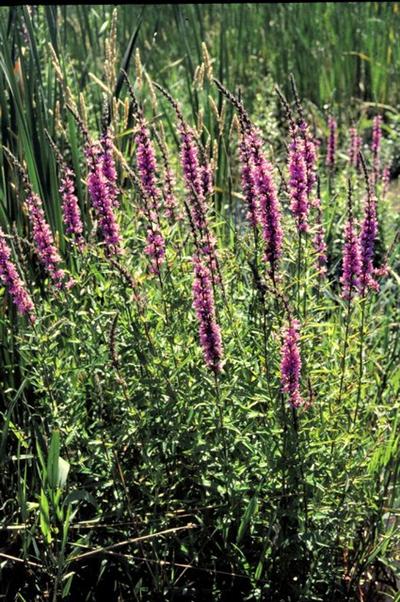Invasive Species Language Workshop designed to get people talking
Communicating effectively about invasive species, whether the plants and animals are on land or in water, can be challenging. Is it better to “wage a war” on invasives, or should communicators take an alternative approach?

Purple loosestrife, a pretty but invasive plant. Image credit: Wisconsin Sea Grant
In conjunction with National Invasive Species Awareness Week, the Sea Grant programs in Michigan, Oregon and Wisconsin are hosting a workshop with the North American Invasive Species Management Association on the topic of using messaging and metaphors in communicating about invasion biology. The “Invasive Species Language Workshop,” will be held online and in-person on Feb. 27-28. A virtual half-day of webinar presentations will be followed by a full-day workshop in Washington, D.C., where attendees will draft guidelines and research priorities for inclusive communication and naming conventions. Researchers, science communicators and invasive species managers are encouraged to attend.
“Our goal is to learn what everybody’s doing in their respective fields, and then get everyone together to talk it out and describe any successes they’ve had in advocating for better and more inclusive language about invasive species,” said El Lower, Great Lakes Aquatic Nonindigenous Species Information System communications specialist with Michigan Sea Grant. “It’s about how we can work together to promote a set of best practices and present a unified front across invasion biology.
“We can come up with different metaphors that are not just ‘good versus evil, us versus them,’ and actually get into some of the nuance involved in managing invasive species. Sometimes that gets lost in the wash if you’re simply focusing on military metaphors,” Lower added.
Another issue with invasive species are their names. Some species names may contain racial slurs or reinforce xenophobic concepts. Efforts to develop more inclusive guidelines for naming invasive species have been limited, and this will be an additional focus of the webinar and workshop.
“Scientists and natural resource managers often believe that the language and points they make are neutral; that they’re just the facts. However, even when communicating facts, we all use value-laden language or language that may be received differently than intended,” said Tim Campbell, Wisconsin Sea Grant AIS program coordinator. “By embracing this inclusive language and naming conventions, we can reduce unintended consequences of our communication products, and we be more effective in our aquatic invasive species management efforts.”
Registration is now open for the sessions. Visit the website here.
Funding for the workshop was provided by the National Sea Grant Office.
The post Invasive Species Language Workshop designed to get people talking first appeared on Wisconsin Sea Grant.News Releases | Wisconsin Sea Grant
News Releases | Wisconsin Sea Grant
https://www.seagrant.wisc.edu/news/invasive-species-language-workshop-designed-to-get-people-talking/

